Sir John Monash, Personal Files Book 12, 1 March - 29 April 1916, Part 8
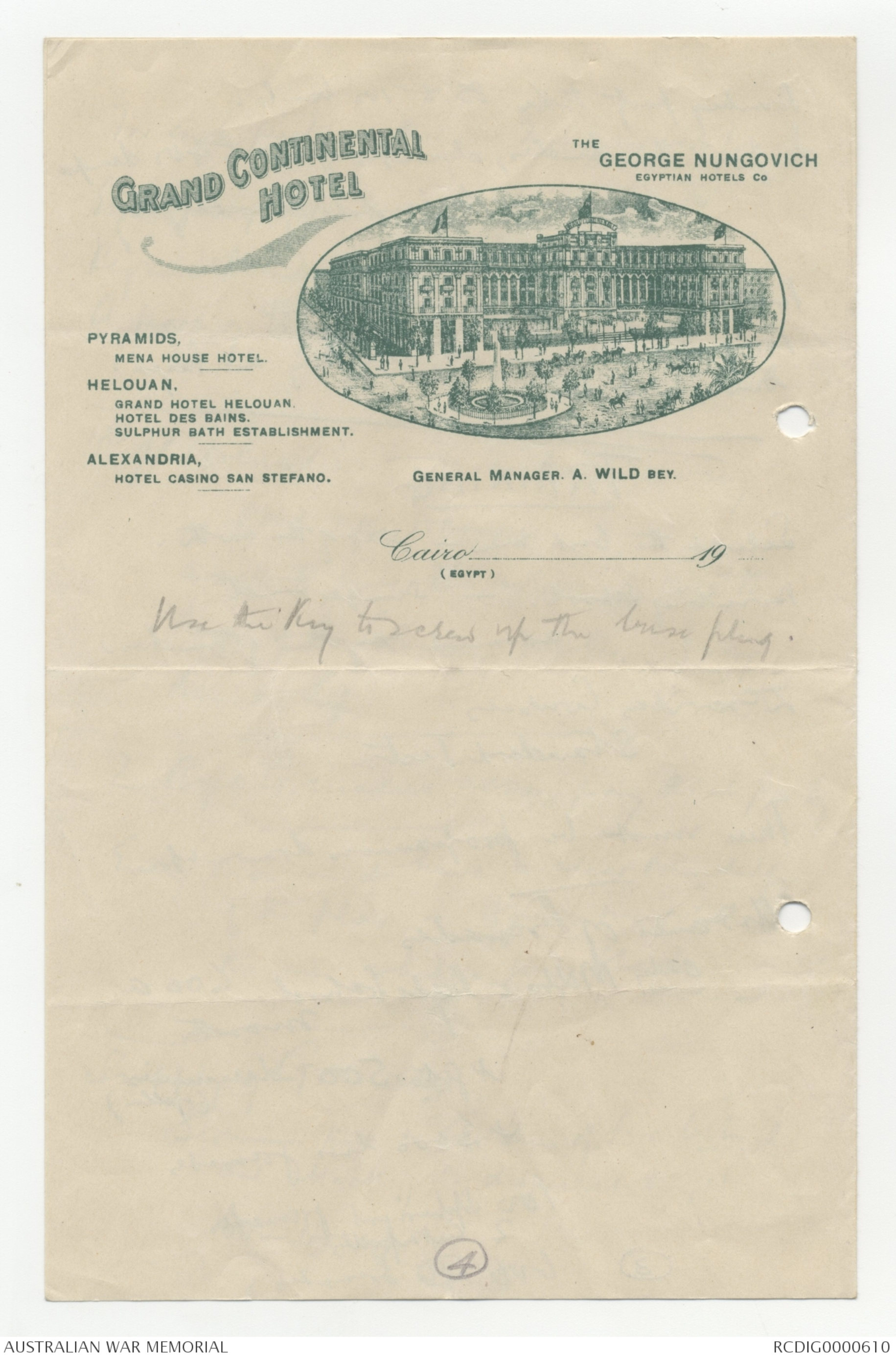
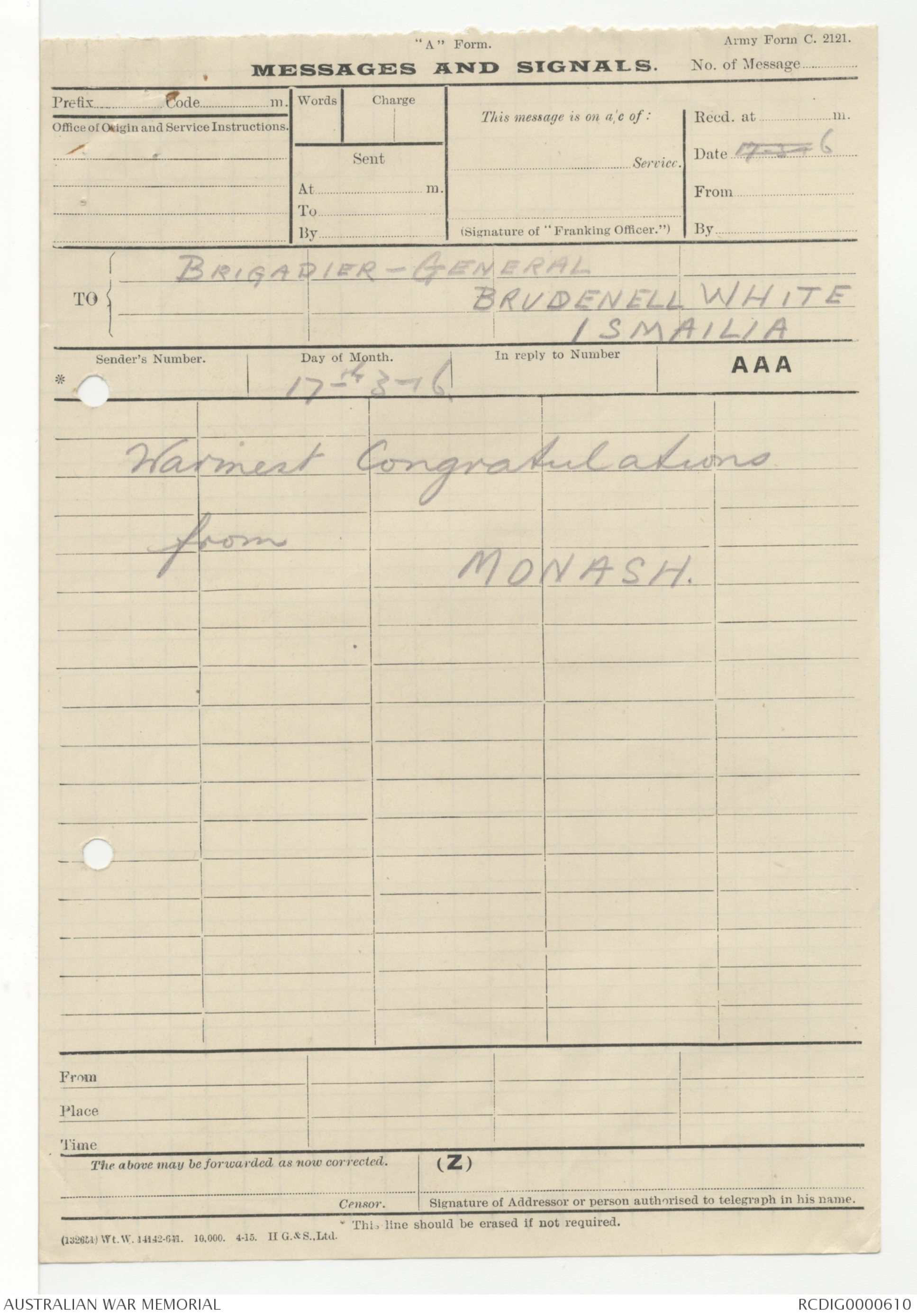
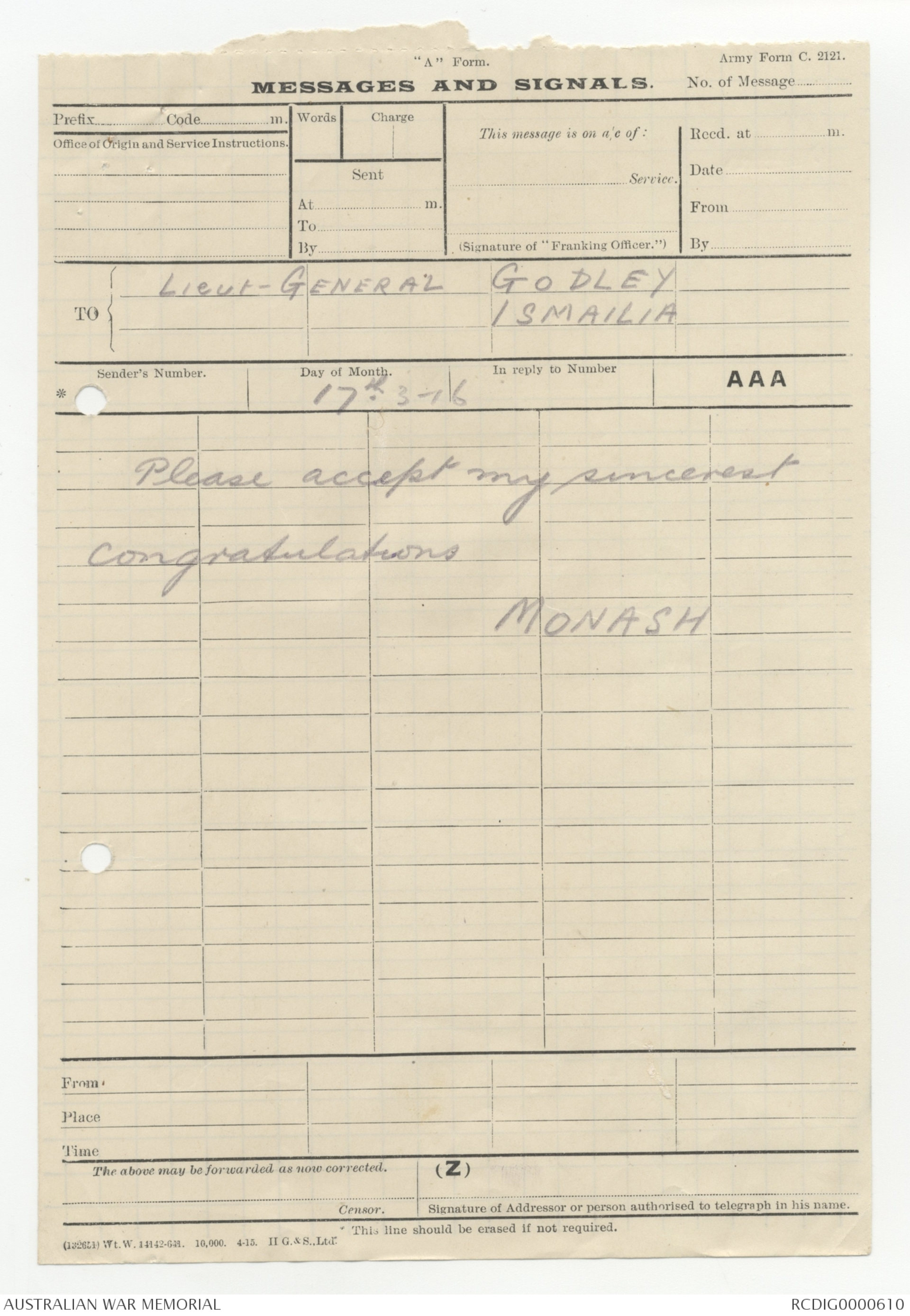
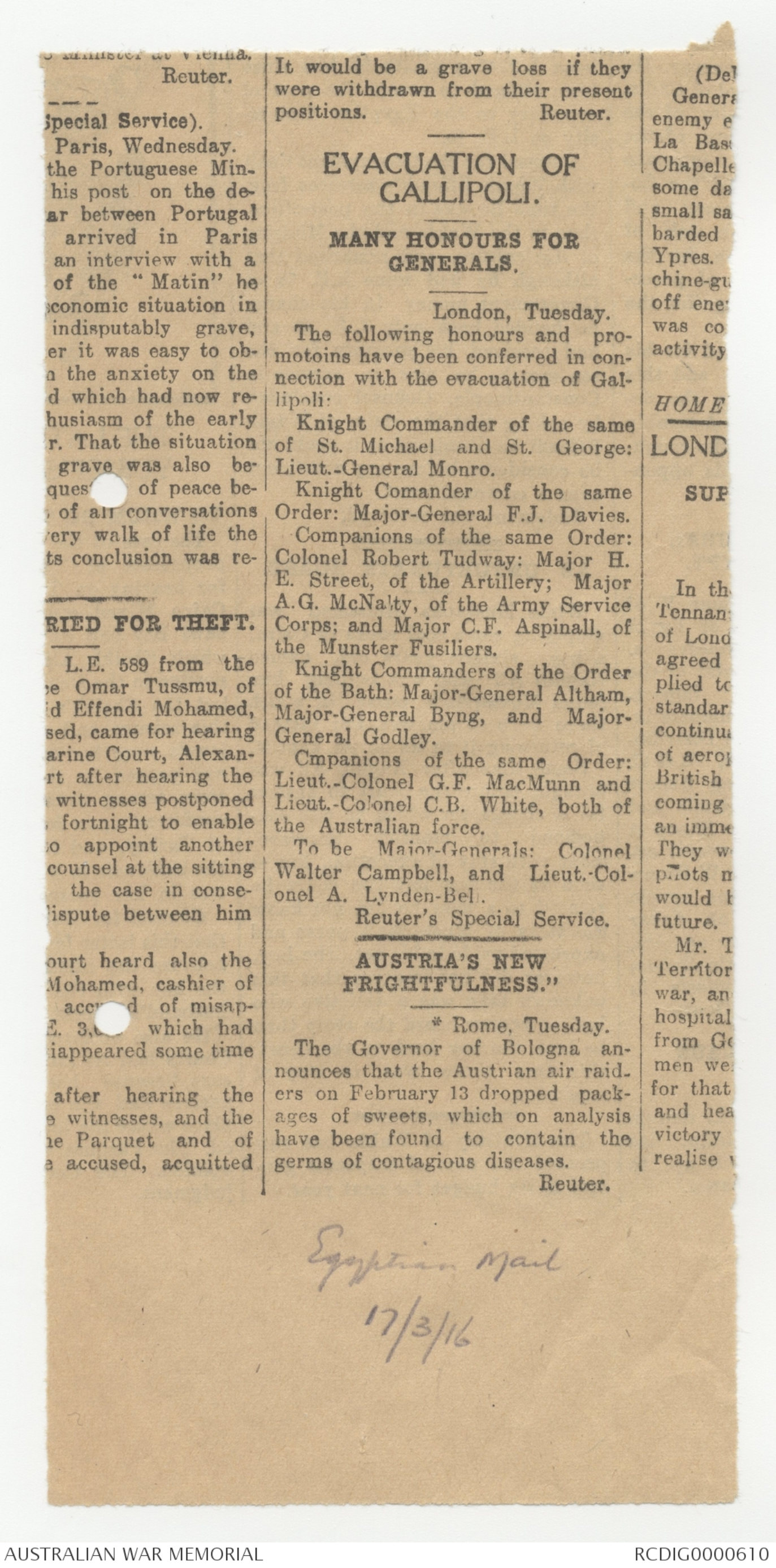
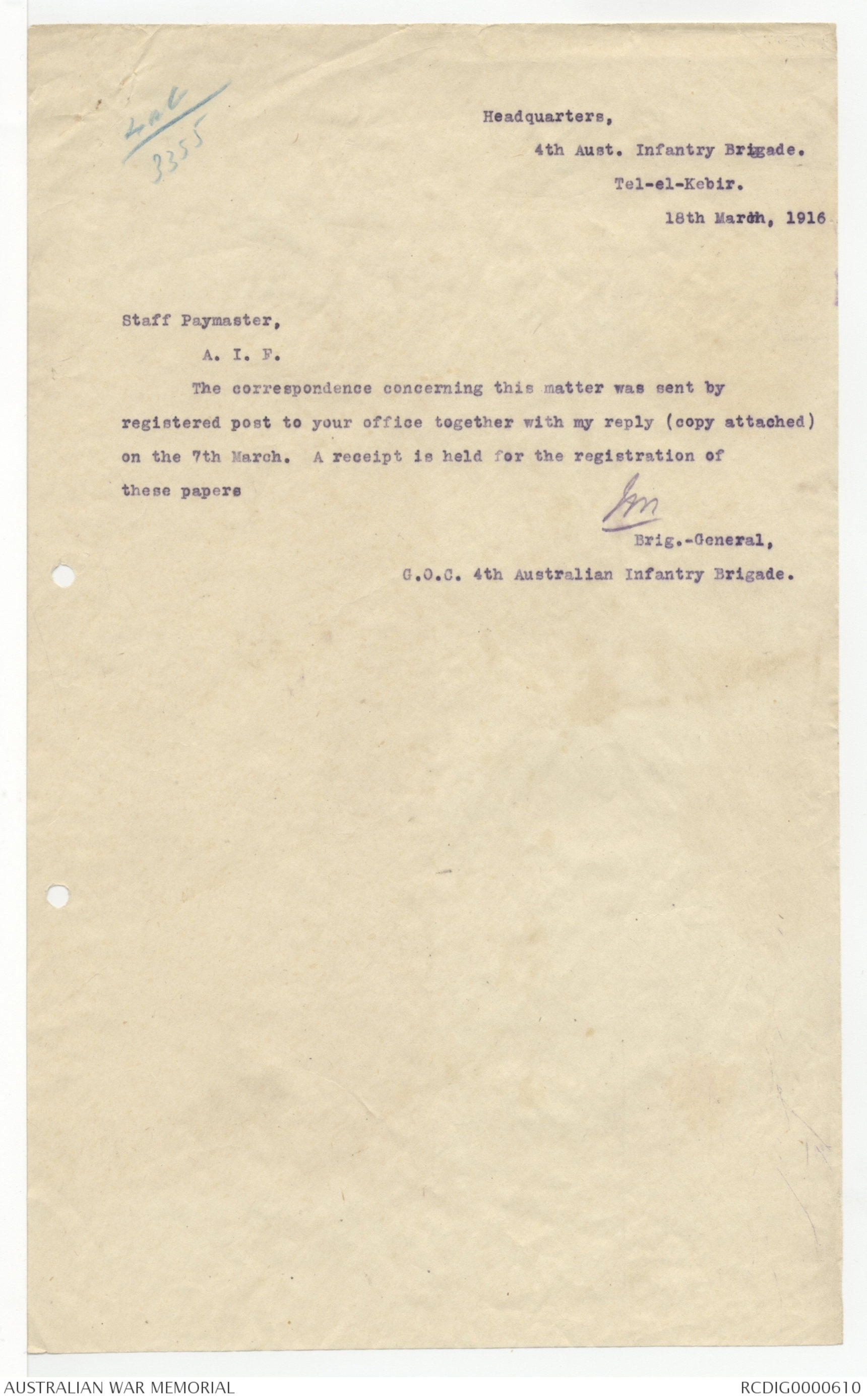
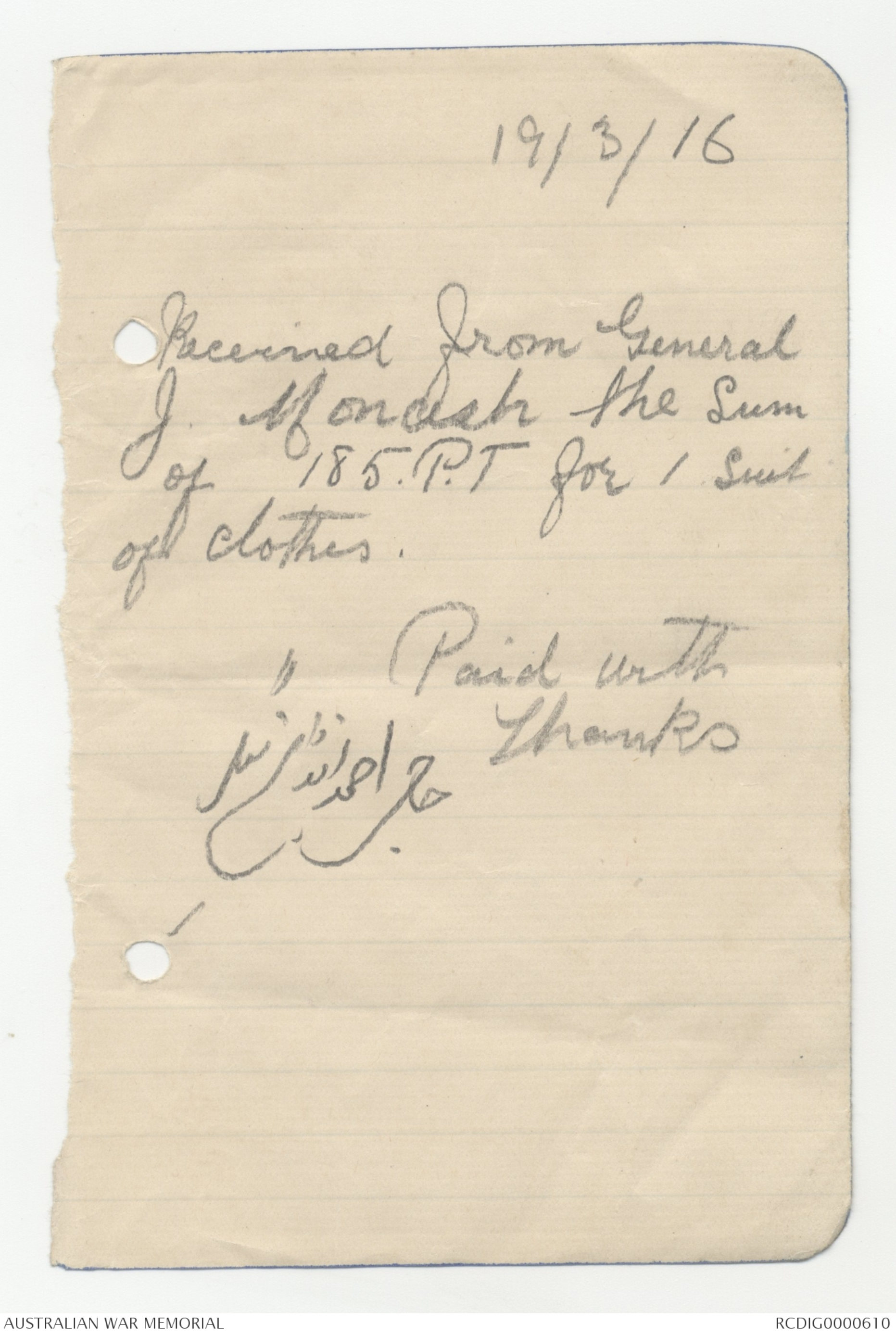
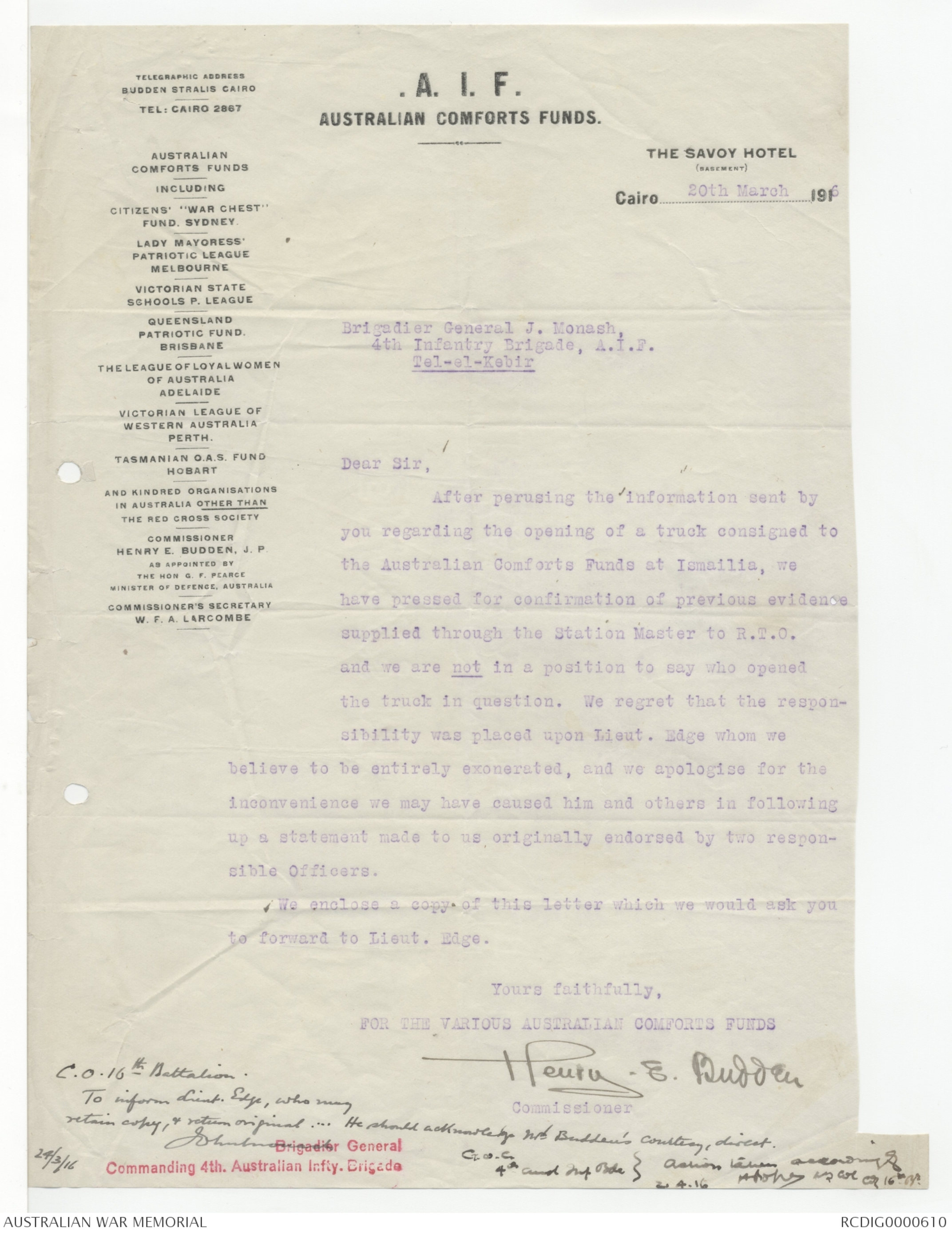
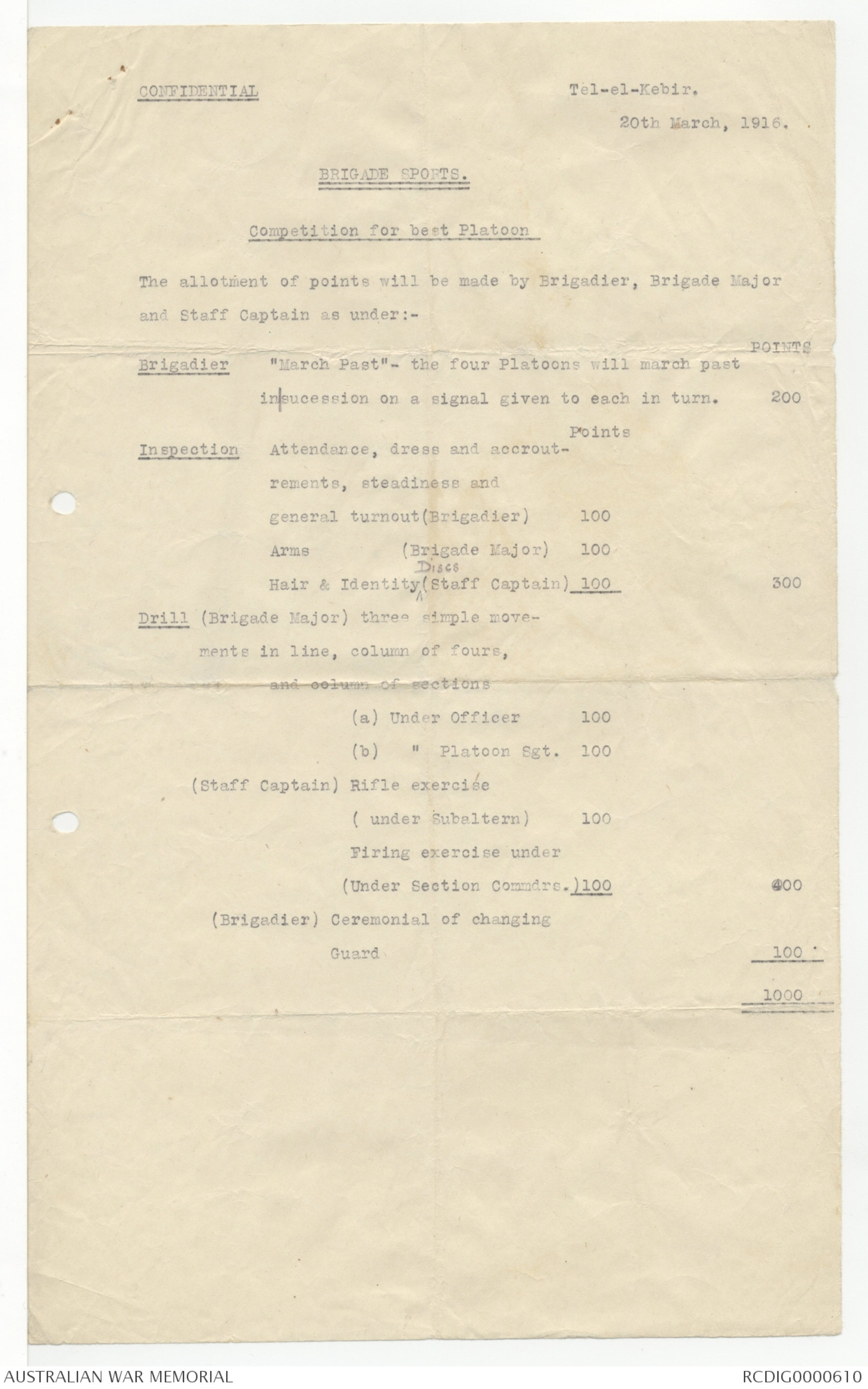
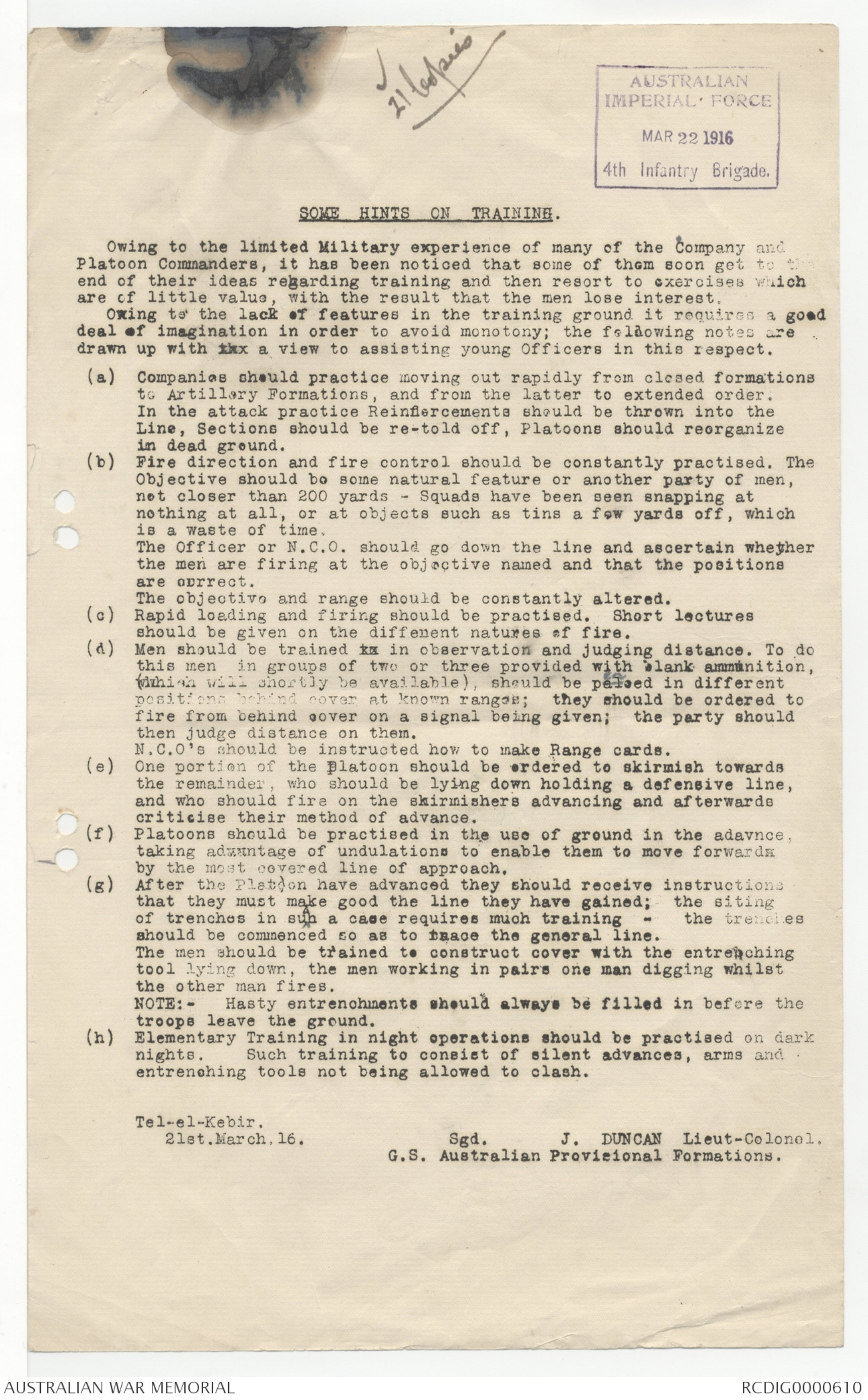
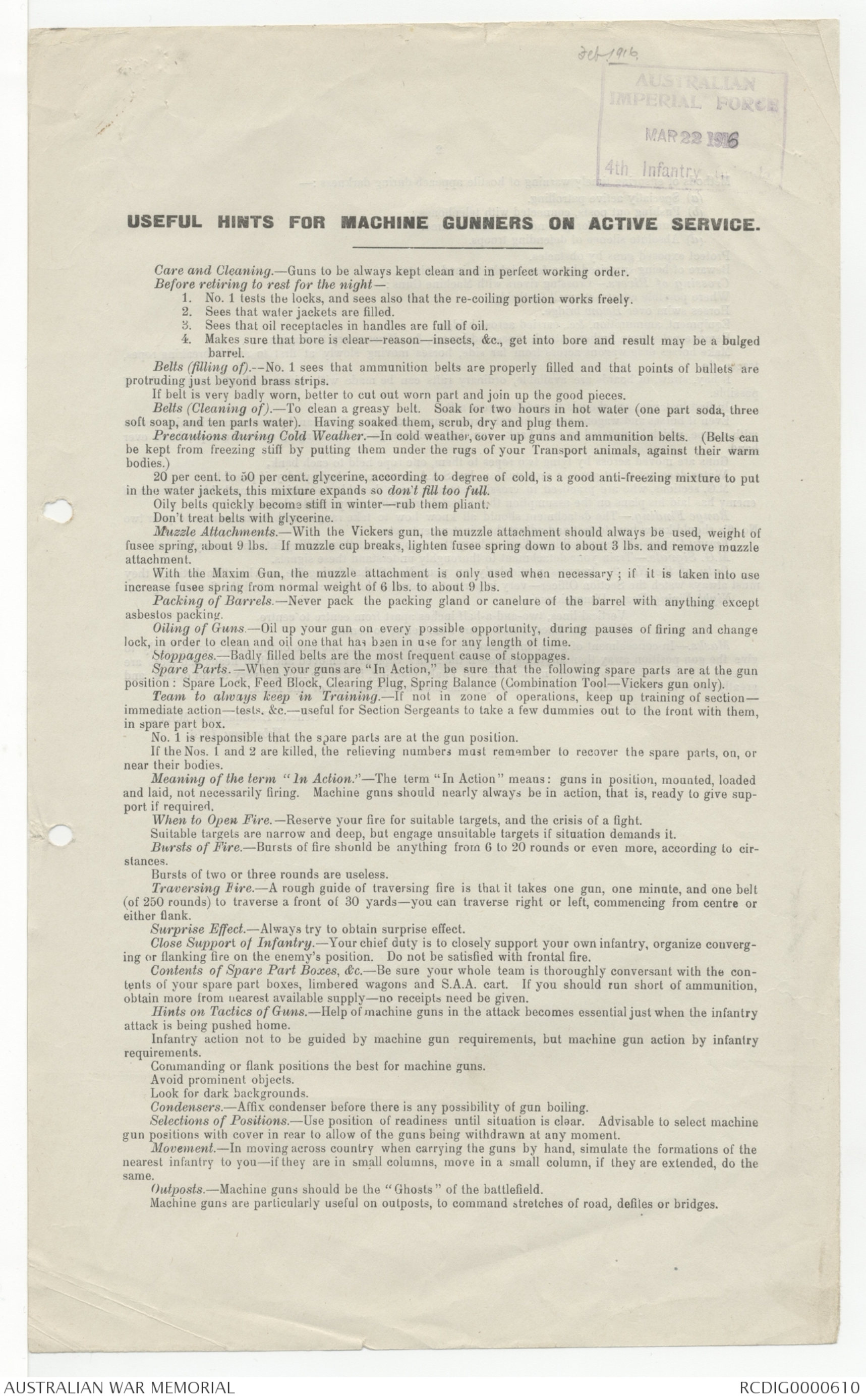
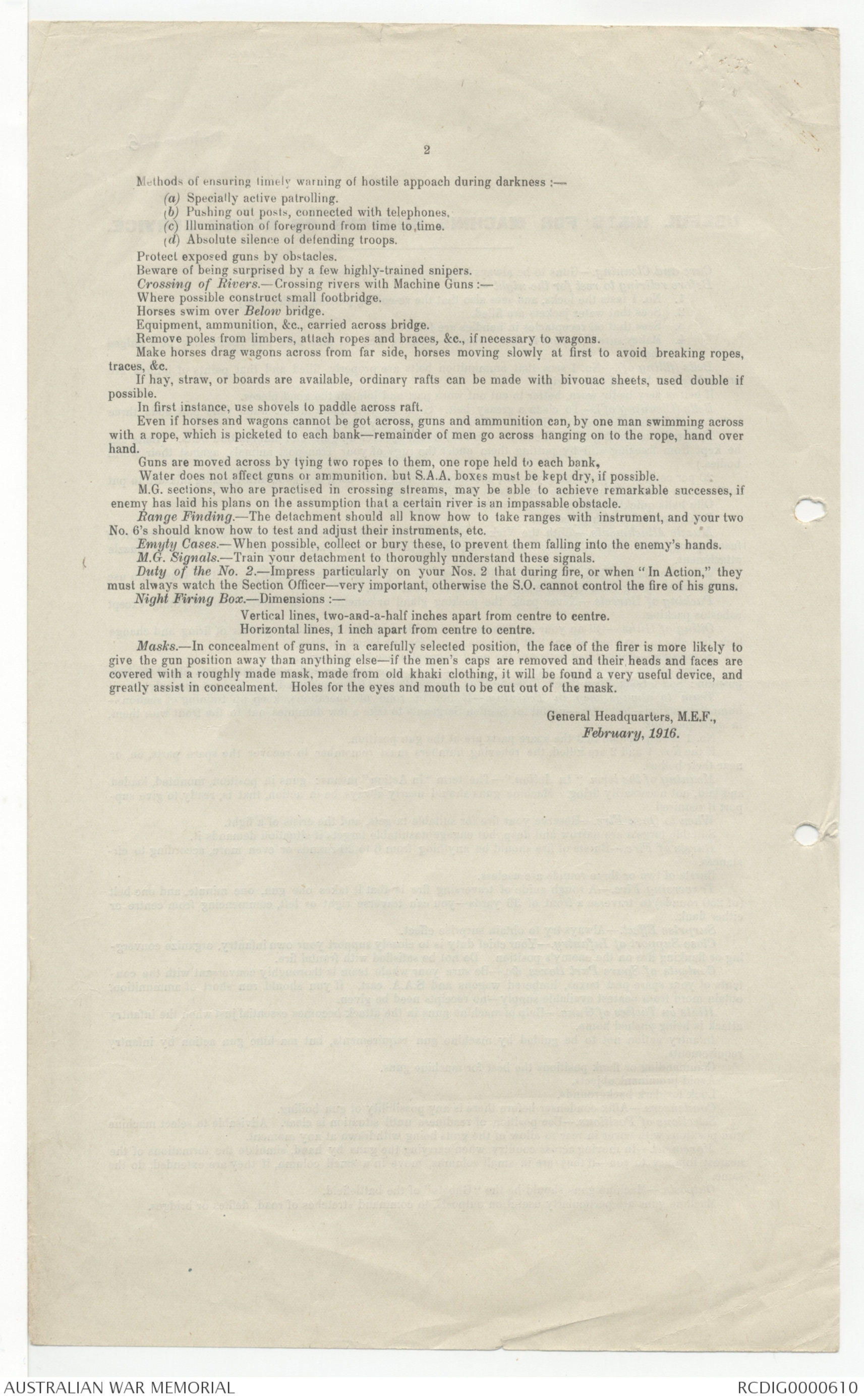
GRAND CONTINENTAL
HOTEL
THE GEORGE NUNGOVICH
EGYPTIAN HOTELS Co
PYRAMIDS
MENA HOUSE HOTEL.
HELOUAN.
GRAND HOTEL HELOUAN
HOTEL DES BAINS.
SULPHUR BATH ESTABLISHMENT.
ALEXANDRIA,
HOTEL CASINO SAN STEFANO. GENERAL MANAGER. A. WILD BEY.
Cairo...................................................................................19.........
(EGYPT)
Use the key to screw up the fuse plug.
"A" Form Army Form C. 2121.
MESSAGES AND SIGNALS. No. of Message ...
Prefix...................Code..............m Words Charge This message is on a'c of: Reed. at..................m
Office of Origin and Service instructions
............................................ Sent ....................................Service. Date 17-3-46
............................................ At....................m From.............................
............................................ To......................... ........................................................
............................................ By......................... (Signature of "Franking Officer") By.........................
{ B R I G A D I E R - G E N E R A L
{TO B R U D E N E L L W H I T E
{ / S M A I L I A
Sender's number Day of Month. In reply to Number A A A
* 17th 3 - 16.
Warmest Congratulations
from
M O N A S H
From
Place
Time
The above may be forwarded as now corrected. (Z)
Censor. Signature of Addressor or person authorised to telegraph in his name
This line should be erased if not required.
(132654) Wt.W 44142-6-N. 10.0000. 4-15. H G.&S.,Ltd.
"A" Form Army Form C. 2121.
MESSAGES AND SIGNALS. No. of Message ...
Prefix...................Code..............m Words Charge This message is on a'c of: Reed. at..................m
Office of Origin and Service instructions
............................................ Sent ....................................Service. Date 17-3-46
............................................ At....................m From.............................
............................................ To......................... ........................................................
............................................ By......................... (Signature of "Franking Officer") By.........................
{ L I E U T - G E N E R A L G O D L E Y
{TO B R U D E N E L L W H I T E
{ / S M A I L I A
Sender's number Day of Month. In reply to Number A A A
* 17th 3 - 16.
Please accept my sincerest
Congratulations
M O N A S H
From
Place
Time
The above may be forwarded as now corrected. (Z)
Censor. Signature of Addressor or person authorised to telegraph in his name
This line should be erased if not required.
(132654) Wt.W 44142-6-N. 10.0000. 4-15. H G.&S.,Ltd.
EVACUATION OF
GALLIPOLI.
_____________
MANY HONOURS FOR
GENERALS.
______________
London, Tuesday.
The following honours and pro
motions have been conferred in con-
nection with the evacuation of Gal-
lipoli:
Knight Commander of the same
of St Michael) and St. George:
Lieut-General Monro.
Knight Comander of the same
Order: Major-General F.J. Davies.
Companions of the same Order:
Colonel Robert Tudway: Major H.
E. Street, of the Artillery; Major
A.G. McNalty, of the Army Service
Corps; and Mayor C.F. Aspinall, of
the Munster Fusiliers.
Knight Commanders of the Order
of the Bath: Major-General Altham,
Major-General Byng, and Major-
General Godley.
Cmpanions of the same Order:
Lieut.-Colonel G.F. MacMunn and
Lieut-Colonel C.B. White, both of
the Australian force.
To be Major-Generals: Colonel
Walter Campbell, and Lieut.Colonel
A. Lynden-Bel.
Reuters Special Service.
AUSTRIA'S NEW
FRIGHTFULNESS."
* Rome, Tuesday.
The Governor of Bologna an-
nounces that the Austrian air raid-
ers on February 13 dropped pack-
ages of sweets, which on analysis
have been found to contain, the
germs of contagious diseases.
Reuter.
[*Egyptian Mail
17/3/16*]
4aG
3355
Headquarters,
4th Aust. Infantry Brigade.
Tel-el-Kebir.
18th March, 1916
Staff Paymaster,
A.I.F.
The correspondence concerning this matter was sent by
registered post to your office together with my reply (copy attached)
on the 7th March. A receipt is held for the registration of
these papers
JM
Brig.-Ceneral,
G.O.C. 4th Australian Infantry Brigade.
19/3/ 16
Received from General
J Monash the Sum
of 185. P.T for 1 suit
of clothes.
Paid with
Thanks
[signature in Arabic]
TELEGRAPHIC ADDRESS . A .I . F .
BUDDEN STRALIS CAIRO
TEL: CAIRO 2867 AUSTRALIAN COMFORTS FUNDS. THE SAVOY HOTEL AUSTRALIAN (BASEMENT)
COMFORT FUNDS
INCLUDING Cairo ...20th March... 1916
CITIZENS' "WAR CHEST"
FUND. SYDNEY
LADY MAYORESS'
PARIOTIC LEAGUE
MELBOURNE
VICTORIAN STATE
SCHOOLS P.LEAGUE
MELBOURNE
QUEENSLAND Brigadier General J.Monash,
PATRIOTIC FUND 4th Infantry Brigade, A.I.F.
BRISBANE Tel-al-Kebir
THE LEAGUE OF LOYAL WOMEN
OF AUSTRALIA
ADELAIDE
VICTORIAN LEAGUE OF
WESTERN AUSTRALIA
PERTH
TASMANIAN O.A.S. Dear Sir,
HOBART
AND KINDRED ORGANISATIONS After perusing the information sent by
IN AUSTRALIA OTHER THAN you regarding the opening of a truck consigned to
THE RED CROSS SOCIETY the Australian Comforts Funds at Ismailia, we
COMMISSIONER have pressed for confirmation of previous evidence
HENRY E BUDDEN J.P. supplied through the Station Master to R.T.O.
AS APPOINTED BY and we are not in a position to say who opened
THE HON. G.F.PEARCE the truck in question. We regret that the respon-
MINISTER OF DEFENCE, AUSTRALIA sibility was placed upon Lieut. Edge whom we
COMMISSIONER'S SECRETARY believe to be entirely exonerated, and we apologise for the
W.F.A. LARCOMBE inconvenience we may have caused him and others in following
up a statement made to me originally endorsed by two respon-
sible officers.
We enclose a copy of this letter which we would ask you
to forward to Lieut. Edge.
Yours faithfully,
FOR THE VARIOUS AUSTRALIAN COMFORTS FUNDS (SIGNED) Henry . E. Budden
Commissioner
C.O.16th Battalion to inform Liet Edge, who may
retain copy and return original . ... He should acknowledge Mr Budden's courtesy, direct.
(signed John Monash)
Brigadier General
Commanding 4th. Australian Infty Brigade G.O.C. {Action taken accordingly
4th [[?]] Inf Bde { A Johns Lt Col [[??? ]]
2.4.16
CONFIDENTIAL Tel-el-Kebir.
20th March, 1916.
BRIGADE SPORTS.
Competition for best Platoon
The allotment of points will be made by Brigadier, Brigade Major
and Staff Captain as under:-
| POINTS | |||
| Brigadier | "March Past" - the four Platoons will march past in succession on a signal given to each in turn. |
200 |
|
| Inspection |
Attendance, dress and accrout- rements, steadiness and |
100 |
|
| Arms (Brigade Major) | 100 |
|
|
| Hair & Identify ^Discs (Staff Captain) | 100 |
300 |
|
| Drill |
(Brigade Major) three simple move- ments in line, column of fours, |
100 100 |
|
| (Staff Captain) Rifle exercise (under Subaltern) Firing exercise under (Under Section Commdrs.) |
100
|
|
|
| (Brigadier) Ceremonial of changing Guard |
|
||
|
1000 |
[*21 copies*]
AUSTRALIAN
IMPERIAL FORCE
MAR 22 1916
4th Infantry Brigade.
SOME HINTS ON TRAINING.
Owing to the limited Military experience of many of the Company and
Platoon Commanders, it has been noticed that some of them soon get to the
end of their ideas regarding training and then resort to exercises which
are of little value, with the result that the men lose interest.
Owing to the lack of features in the training ground it requires a good
deal of imagination in order to avoid monotony; the following notes are
drawn up with a view to assisting young Officers in this respect.
(a) Companies should practice moving out rapidly from closed formations
to Artillery Formations, and from the latter to extended order.
In the attack practice Reinforcements should be thrown into the
Line, Sections should be re-told off, Platoons should reorganize
in dead ground.
(b) Fire direction and fire control should be constantly practised. The
Objective should be some natural feature or another party of men,
not closer than 200 yards - Squads have been seen snapping at
nothing at all, or at objects such as tins a few yards off, which
is a waste of time.
The Officer or N.C.O. should go down the line and ascertain whether
the men are firing at the objective named and that the positions
are correct.
The objective and range should be constantly altered.
(c) Rapid loading and firing should be practised. Short lectures
should be given on the different natures of fire.
(d) Men should be trained in in observation and judging distance. To do
this men in groups of two or three provided with blank ammunition,
which will shortly be available), should be pelsed (corrected by hand to "placed")in different
positions behind cover at known ranges; they should be ordered to
fire from behind cover on a signal being given; the party should
then judge distance on them.
N.C.O's should be instructed how to make Range cards.
(e) One portion of the platoon should be ordered to skirmish towards
the remainder, who should be lying down holding a defensive line,
and who should fire on the skirmishers advancing and afterwards
criticise their method of advance.
(f) Platoons should be practised in the use of ground in the advance,
taking advantage of undulations to enable them to move forwards
by the most covered line of approach.
(g) After the Platoon have advanced they should receive instructions|
that they must make good the line they have gained; the siting
of trenches in such a case requires much training - the trenches
should be commenced so as to trace the general line.
The men should be trained to construct cover with the entrenching
tool lying down, the men working in pairs one man digging whilst
the other man fires.
NOTE:- Hasty entrenchments should always be filled in before the
troops leave the ground.
(h) Elementary Training in night operations should be practised on dark
nights. Such training to consist of silent advances, arms and
entrenching tools not being allowed to clash.
Tel-el-Kebir.
21st. March. 16.
Sgd. J. DUNCAN Lieut-Colonel.
G.S. Australian Provisional Formations.
[*Feb 1916*]
AUSTRALIAN
IMPERIAL FORCE
MAR 22 1916
4th Infantry Brigade
USEFUL HINTS FOR MACHINE GUNNERS ON ACTIVE SERVICE.
Care and Cleaning. - Guns to be always kept clean and in perfect working order.
Before retiring to rest for the night -
1. No. 1 tests the locks, and sees also that the re-coiling portion works freely.
2. Sees that water jackets are filled.
3. Sees that oil receptacles in handles are full of oil.
4. Makes sure that bore is clear-reason- insects, &c., get into bore and result may be a bulged
barrel.
Belts (filling of). - No. 1 sees that ammunition belts are properly filled and that points of bullets are
protruding just beyond brass strips.
If belt is very badly worn, better to cut out worn part and join up the good pieces.
Belts (Cleaning of). - To clean a greasy belt. Soak for two hours in hot water (one part soda, three
soft soap, and ten parts water). Having soaked them, scrub, dry and plug them.
Precautions during Cold Weather. - In cold weather, cover up guns and ammunition belts. (Belts can
be kept from freezing stiff by putting them under the rugs of your Transport animals, against their warm
bodies)
20 per cent, to 50 per cent glycerine, according to degree of cold, is a good anti-freezing mixture to put
in the water jackets, this mixture expands so don't fill too full.
Oily belts quickly become stiff in winter - rub them pliant:
Don't treat belts with glycerine.
Muzzle Attachments - With the Vickers gun, the muzzle attachment should always be used, weight of
fusee spring, about 9 lbs. If muzzle cup breaks, lighten fusee spring down to about 3 lbs. and remove muzzle
attachment.
With the Maxim Gun, the muzzle attachment is only used when necessary ; if is taken into use
increase fusee spring from normal weight of 6 lbs. to about 9 lbs.
Packing of Barrels - Never pack the packing gland or canelure of the barrel with anything except
asbestos packing.
Oiling of Guns - Oil up your gun on every possible opportunity, during pauses of firing and change
lock, in order to clean and oil one that has been in use for any length of time.
Stoppages - Badly filled belts are the most frequent cause of stoppages.
Spare Parts. - When your guns are "In Action," be sure that the following spare parts are at the gun
position: Spare Lock, Feed Block, Clearing Plug, Spring Balance (Combination Tool--Vickers gun only)
Team to always keep in Training — If not in zone of operations, keep up training of section —
immediate action - tests. &c. - useful for Section Sergeants to take a few dummies out to the front with them,
in spare part box.
No. 1 is responsible that the spare parts are at the gun position.
If the Nos. I and 2 are killed, the relieving numbers must remember to recover the spare parts, on, or
near their bodies.
Meaning of the term "ln Action" - The term "In Action" means: guns in position, mounted, loaded
and laid, not necessarily firing. Machine guns should nearly always be in action, that is, ready to give
support if required.
When to Open Fire. - Reserve your fire for suitable targets, and the crisis of a fight.
Suitable targets are narrow and deep, but engage unsuitable targets if situation demands it.
Bursts of Fire - Bursts of fire should be anything from 6 to 20 rounds or even more, according to circumstances.
Bursts of two or three rounds are useless.
Traversing Fire. - A rough guide of traversing fire is that it takes one gun, one minute, and one belt
(of 250 rounds) to traverse a front of 30 yards — you can traverse right or left, commencing from centre or
either flank.
Surprise Effect. - Always try to obtain surprise effect.
Close Support of Infantry - Your chief duty is to closely support your own infantry, organize converging
or flanking fire on the enemy's position. Do not be satisfied with frontal fire.
Contents of Spare Part Boxes, &c. - Be sure you whole team is thoroughly conversant with the contents
of your spare part boxes, limbered wagons and S.A.A. cart. If you should run short of ammunition,
obtain more from nearest available supply - no receipts need be given.
Hints on Tactics of Guns. - Help of machine guns in the attack becomes essential just when the infantry
attack is being pushed home.
Infantry action not to be guided by machine gun requirements, but machine gun action by infantry
requirements.
Commanding or flank positions the best for machine guns.
Avoid prominent objects.
Look for dark backgrounds.
Condensers. - Affix condenser before there is any possibility of gun boiling.
Selections of Positions - Use position of readiness until situation is clear. Advisable to select machine
gun positions with cover in rear to allow of the guns being withdrawn at any moment.
Movement - In moving across country when carrying the guns by hand, simulate the formations of the
nearest infantry to you - if they are in small columns, move in a small column, if they are extended, do the
same.
Outposts. - Machine guns should be the "Ghosts" of the battlefield.
Machine guns are particularly useful on outposts, to command stretches of road, defiles or bridges.
2
Methods of ensuring timely warning of hostile appoach during darkness:-
(a) Specially active patrolling.
(b) Pushing out posts, connected with telephones.
(c) Illumination of foreground from time to time.
(d) Absolute silence of defending troops.
Protect exposed guns by obstacles.
Beware of being surprised by a few highly-trained snipers.
Crossing of Rivers - Crossing rivers with Machine Guns:-
Where possible construct small footbridge.
Horses swim over Below bridge.
Equipment ammunition, &c, carried across bridge.
Remove poles from limbers, attach ropes and braces, &c, if necessary to wagons.
Make horses drag wagons across from far side, horses moving slowly at first to avoid breaking ropes,
traces &c.
If hay, straw, or boards are available, ordinary rafts can be made with bivouac sheets, used double if
possible.
In first instance, use shovels 1o paddle across raft.
Even if horses and wagons cannot be got across, guns and ammunition can, by one man swimming across
with a rope, which is picketed to each bank - remainder of men go across hanging on to the rope, hand over
hand.
Guns are moved across by tying two ropes to them, one rope held to each bank.
Water does not affect guns or ammunition, but S.A.A. boxes must be kept dry, if possible.
M.G. sections, who are practised in crossing streams, may be able to achieve remarkable successes, if
enemy has laid his plans on the assumption that a certain river is an impassable obstacle.
Range Finding - The detachment should all know how to take ranges with instrument, and your two
No. 6's should know how to test and adjust their instruments, etc.
Empty Cases - When possible, collect or bury these, to prevent them falling into the enemy's hands.
M.G. Signals -Train your detachment to thoroughly understand these signals.
Duty of the No. 2 - Impress particularly on your Nos. 2 that during fire, or when "In Action," they
must always watch the Section Officer - very important, otherwise the S.O. cannot control the fire of his guns.
Night Firing Box - Dimensions:-
Vertical lines, two-and-a-half inches apart from centre to centre.
Horizontal lines, 1 inch apart from centre to centre.
Masks - In concealment of guns, in a carefully selected position, the face of the firer is more likely to
give the gun position away than anything else - if the men's caps are removed and their heads and faces are
covered with a roughly made mask, made from old khaki clothing, it will be found a very useful device, and
greatly assist in concealment. Holes for the eyes and mouth to be cut out of the mask.
General Headquarters, M.E.F.,
February, 1916.
 JayB
JayBThis transcription item is now locked to you for editing. To release the lock either Save your changes or Cancel.
This lock will be automatically released after 60 minutes of inactivity.